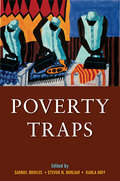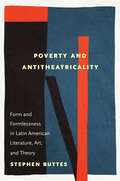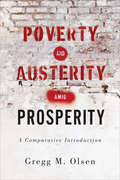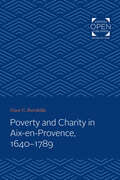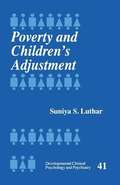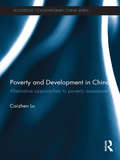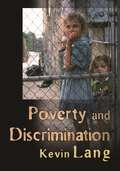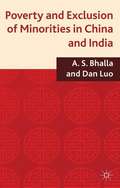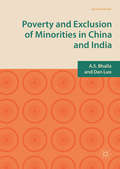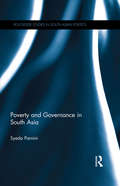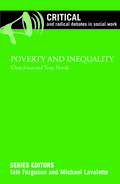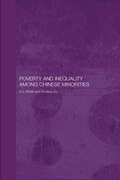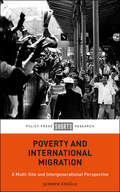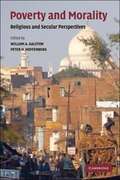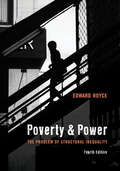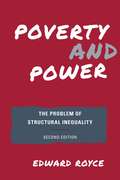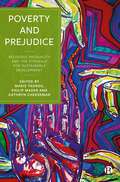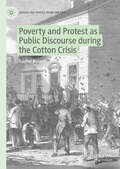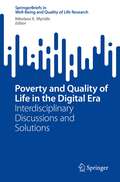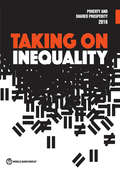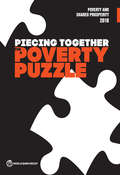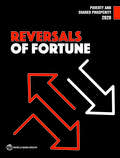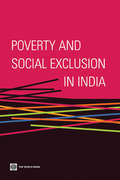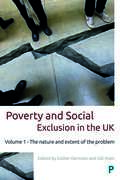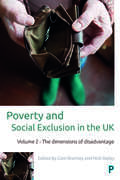- Table View
- List View
Poverty Traps
by Samuel Bowles Steven N. Durlauf Karla HoffMuch popular belief--and public policy--rests on the idea that those born into poverty have it in their power to escape. But the persistence of poverty and ever-growing economic inequality around the world have led many economists to seriously question the model of individual economic self-determination when it comes to the poor. In Poverty Traps, Samuel Bowles, Steven Durlauf, Karla Hoff, and the book's other contributors argue that there are many conditions that may trap individuals, groups, and whole economies in intractable poverty. For the first time the editors have brought together the perspectives of economics, economic history, and sociology to assess what we know--and don't know--about such traps. Among the sources of the poverty of nations, the authors assign a primary role to social and political institutions, ranging from corruption to seemingly benign social customs such as kin systems. Many of the institutions that keep nations poor have deep roots in colonial history and persist long after their initial causes are gone. Neighborhood effects--influences such as networks, role models, and aspirations--can create hard-to-escape pockets of poverty even in rich countries. Similar individuals in dissimilar socioeconomic environments develop different preferences and beliefs that can transmit poverty or affluence from generation to generation. The book presents evidence of harmful neighborhood effects and discusses policies to overcome them, with attention to the uncertainty that exists in evaluating such policies.
Poverty and Antitheatricality: Form and Formlessness in Latin American Literature, Art, and Theory
by Stephen ButtesPoverty and Antitheatricality argues that many major analytical approaches today misunderstand the problem of poverty by emphasizing its status as an experience. These experiential models transform poverty from a specific socioeconomic status lived in a particular historical sequence into a transhistorical presence of marginality that is not only inevitable but necessary. Embedded in capitalist, socialist, and populist forms of socioeconomic organization, these models paradoxically suggest that if we want to have a world free of poverty, we must always have the poor and their experience of formlessness. Taking up the paired terms—form and formlessness—Stephen Buttes demonstrates how they sustain not only debates about poverty and its political role within modernity but also the idea of the work of art within the history of modernism. Offering critiques of critical theory alongside new readings of both canonical and little-studied Latin American authors and artists, Poverty and Antitheatricality makes a compelling case that understanding the kind of problem the work of art is opens up overlooked but essential pathways to understanding poverty and the kind of problem it is.
Poverty and Austerity amid Prosperity: A Comparative Introduction
by Gregg M. OlsenPoverty and Austerity amid Prosperity puts a sharp focus on rising levels of poverty and homelessness in Canada, the United Kingdom, and the United States. Highlighting the important differences between these countries, Gregg M. Olsen examines how poverty and homelessness have been conceptualized, defined, measured, and addressed in each country. Olsen critically contrasts the two main theoretical traditions – individual and societal – that have emerged to explain poverty and homelessness. Ultimately, he argues that societal approaches to the study of poverty are better equipped to explain the developments unfolding across these nations and that the eradication of poverty will only happen when the socioeconomic system has been seriously overhauled and founded upon economic democracy.
Poverty and Charity in Aix-en-Provence, 1640-1789 (The Johns Hopkins University Studies in Historical and Political Science)
by Cissie C. FairchildsOriginally published in 1976. This book is a study of the charitable institutions of one French town, Aix-en-Provence. It begins with their foundation during the Counter-Reformation and ends with their dissolution during the Revolution. It details the impulses behind their foundation and describes how they were financed and administered. It also explores the lives of the people they helped. The study is based primarily on surviving records of the charities. These are the same sort of records that charitable institutions today accumulate: entrance registers, minutes of board meetings, account books, and fund-raising pamphlets. Records of the local and central government and court records were also consulted. One purpose of this study is to bring readers closer to the reality of the problem of poverty in Old Regime France. Another purpose is to historicize contemporary perceptions of poverty in the minds of French historical actors.Chapter 1 outlines the social and economic makeup of Aix-en-Provence. Chapter 2 deals with the attitudes and assumptions behind the foundation of the charities. Chapter 3 describes how the institutions were administered and financed, and the many important roles they played in the community at large. Chapter 4 describes the types of assistance available to the poor and the types of people who received it. Chapter 5 discusses the most important alternatives to charity for the needy—beggary and crime. After 1760, the traditional charities entered a period of decline. Both the economic and social realities of poverty, and popular perceptions of those realities, changed drastically after 1760. Flooded by increasing numbers of the poor, paralyzed financially because of declining donations and general mismanagement, repudiated by public opinion, and subject to increasing control by the state, the charities were ineffective and indeed almost moribund after 1760. Chapters 6 and 7 detail these developments.
Poverty and Children's Adjustment
by Suniya S. LutharAn interdisciplinary perspective on the effects of poverty, lack of education, and other negative socioeconomic forces on children's development
Poverty and Development in China: Alternative Approaches to Poverty Assessment (Routledge Contemporary China Series)
by Caizhen LuChina has made huge economic strides in recent decades but poverty is still a major issue on the agenda for rural China. Poverty and Development in China analyses how poverty is recognized and measured and how people in poverty are identified, literally asking: who is poor in China? Lu Caizhen’s research compares four approaches to poverty assessment: China’s official poverty identification method, the participatory approach to poverty assessment, the monetary approach, and use of multidimensional poverty indicators. Each of these is applied to the same population of households to identify the poor in rural Wuding County, Yunnan Province. The analysis shows that there is in fact very little overlap of households identified as poor by the various means, and that choice of approach does matter in the outcome of who is identified as poor. This has implications at the theoretical, methodological, and policy levels. Lu discusses these in detail, concluding that at present, there is a need to shift away from poverty reduction strategies that narrowly emphasize income generation activities, as these are often short-term efforts. Instead, the focus should move towards a broader combination of short-term and long-term strategies to break poverty’s inter-linked structural causes.
Poverty and Discrimination
by Kevin LangMany ideas about poverty and discrimination are nothing more than politically driven assertions unsupported by evidence. And even politically neutral studies that do try to assess evidence are often simply unreliable. In Poverty and Discrimination, economist Kevin Lang cuts through the vast literature on poverty and discrimination to determine what we actually know and how we know it. Using rigorous statistical analysis and economic thinking to judge what the best research is and which theories match the evidence, this book clears the ground for students, social scientists, and policymakers who want to understand--and help reduce--poverty and discrimination. It evaluates how well antipoverty and antidiscrimination policies and programs have worked--and whether they have sometimes actually made the problems worse. And it provides new insights about the causes of, and possible solutions to, poverty and discrimination. The book begins by asking, "Who is poor?" and by giving a brief history of poverty and poverty policy in the United States in the twentieth century, including the Welfare Reform Act of 1996. Among the topics covered are the changing definition of poverty, the relation between economic growth and poverty, and the effects of labor markets, education, family composition, and concentrated poverty. The book then evaluates the evidence on racial discrimination in areas such as education, employment, and criminal justice, as well as sex discrimination in the labor market, and assesses the effectiveness of antidiscrimination policies. Throughout, the book is grounded in the conviction that we must have much better empirical knowledge of poverty and discrimination if we hope to reduce them.
Poverty and Exclusion of Minorities in China and India
by Dan Luo A. S. BhallaMuslim minorities in China and India form only a small fraction of their respective populations, yet as they principally live in troubled border states, they are of key strategic importance in the war on terror. In this global context, this book explores whether economics is more important than the suppression of rights in explaining social unrest.
Poverty and Exclusion of Minorities in China and India
by Dan Luo A. S. BhallaMuslim minorities in China and India form only a small fraction of their respective populations, yet as they principally live in troubled border states, they are of key strategic importance in the war on terror. In this global context, this book explores whether economics is more important than the suppression of rights in explaining social unrest.
Poverty and Governance in South Asia (Routledge Studies in South Asian Politics)
by Syeda Naushin ParniniAcross South Asia in the last two decades, there has been widespread emphasis on governance reforms aiming to reduce poverty through Millennium Development Goals (MDGs). The recent development agenda has had great impact over the region , and this book finds that it largely widens the gap between the rich and poor, which combined with rising inflation, contributes to political instability. The book analyses the discourses of development agenda and governance crisis and provides a survey of the region by not only focusing on India, Pakistan and Bangladesh but also on the smaller countries in the region, such as Bhutan. Explaining three components of the development agenda as criteria for economic development – poverty reduction, governance reforms and civil society participation through liberal democracy – this book explores the consequences of the neo-liberal democracy and recent development agenda coupled with governance reforms. This work argues that the political economy of South Asia is largely derived from experiences of historical colonialism and recent changes driven by contemporary rise of India as a global power after the triumph of new-liberal democracy and market capitalism in the post-cold war era. It proposes a strengthening of the instruments of endogenous governance and people's participation in South Asian countries to reduce poverty through MDGs and other development goals in combination with top-down and bottom up approaches. Offering an understanding of governance and development in the context of the South Asia, this book will be of interest to academics in the fields of Political Economics, International Development Studies, Political Science, and Governance Studies, as well as policy makers.
Poverty and Inequality (Critical and Radical Debates in Social Work)
by Chris Jones ; Tony NovakNeoliberalism and austerity have led to a growing inequality gap and increasing levels of poverty and social harm. In this short form book, part of the Critical and Radical Debates in Social Work series, Chris Jones and Tony Novak look at consequences of poverty and inequality and the challenge they pose to the engaged social work academic and practitioner. There are many studies of poverty that look at competing definitions (and some of the consequences) of poverty in modern society. Here the authors argue that, especially for a profession with a claimed commitment to values based on equality, social justice and meeting human need, poverty and immiserisation impose a requirement on social workers to speak out and not to collude with social policies that make the plight of the impoverished even harder and their lives even worse.
Poverty and Inequality among Chinese Minorities (Routledge Studies on the Chinese Economy)
by Shufang Qiu Ajit S. BhallaThe number of poor people in China is huge, despite recent economic advances. The minorities in China constitute less than ten per cent of the entire population, yet they represent forty to fifty per cent of the absolute poor. This compelling book investigates the problem of poverty and inequality in and among Chinese ethnic minorities, focusing in particular on two important questions: Have the minorities shared the fruits of spectacular economic growth in China during the past two decades? Is their backwardness due to ethnic and cultural factors or to extremely low incomes? The authors examine the different factors explaining poverty, the relationship between poverty and ethnicity, poverty indicators that permit a comparison between minorities and non-minorities (or the Han majority), economic and demographic characteristics of minorities and their educational, occupational and gender profiles. They consider whether special measures in favour of minorities introduced by the Chinese government have contributed to an improvement in their standard of living. Poverty and Inequality among Chinese Minorities gives original research findings and new thinking on a highly topical issue in Chinese development economics, and fills a gap in the existing economic literature.
Poverty and International Migration: A Multi-Site and Intergenerational Perspective
by Şebnem EroğluInternational migration is a life-changing process, but do the migrants and their families fare economically better than those who stayed behind? Drawing on the largest database available on labour migration to Europe, this book seeks to shed light upon this question through an exploration of poverty outcomes for three generations of settler migrants spanning multiple European destinations, as compared with their returnee and stayer counterparts living in Turkey. As well as documenting generational trends, it investigates the transmission of poverty onto the younger generations. With its unique multi-site and intergenerational perspective, the book provides a rare insight into the economic consequences of international migration for migrants and their descendants.
Poverty and Morality
by William A. Galston Peter H. HoffenbergThis multi-authored book explores the ways that many influential ethical traditions - secular and religious, Western and non-Western - wrestle with the moral dimensions of poverty and the needs of the poor. These traditions include Buddhism, Christianity, Confucianism, Hinduism, Islam, and Judaism, among the religious perspectives; classical liberalism, feminism, liberal-egalitarianism, and Marxism, among the secular; and natural law, which might be claimed by both. The basic questions addressed by each of these traditions are linked to several overarching themes: what poverty is, the particular vulnerabilities of high-risk groups, responsibility for the occurrence of poverty, preferred remedies, how responsibility for its alleviation is distributed, and priorities in the delivery of assistance. This volume features an introduction to the types, scope, and causes of poverty in the modern world and concludes with Michael Walzer's broadly conceived commentary, which provides a direct comparison of the presented views and makes suggestions for further study and policy.
Poverty and Power: The Problem of Structural Inequality
by Edward Royce Rollins CollegePoverty is a serious problem in the United States, more so than commonly imagined, and more so than in other industrialized nations. Most Americans adhere to an individualistic perspective: they believe poverty is largely the result of people being deficient in intelligence, determination, education, and other personal traits. Poverty and Power, Fourth Edition challenges this viewpoint, arguing that poverty arises from the workings of four key structural systems—the economic, the political, the cultural, and the social—and ten obstacles to economic justice, including unaffordable housing, inaccessible health care, and racial and gender discrimination. The author argues that a renewed war on poverty can be successful, but only through a popular movement to bring about significant change in the workings of American economic, political, and cultural institutions.
Poverty and Power: The Problem of Structural Inequality (2nd Edition)
by Edward Royce<p>Poverty and Power asserts that American poverty is a structural problem resulting from failings in our social system rather than individual failings of the poor. Contrary to the popular belief that poverty results from individual deficiencies, author Edward Royce introduces students to the very real structural issues that stack the balance of power in the United States. The book introduces four systems that contribute to inequality in the U.S.--economic, political, cultural, and structural--then discusses ten institutional problems that make life difficult for the poor and contribute to the persistence of poverty. <p>Throughout the book, the author compares individualistic and structural approaches to poverty to assess strengths and limitations of each view. The second edition has been revised throughout with new statistical information, as well as analysis of the recent recession, the Obama presidency, increasing political polarization, the rise of the Tea Party and appearance of the Occupy Movement, new anti-poverty movements, and more.</p>
Poverty and Prejudice: Religious Inequality and the Struggle for Sustainable Development
by Mariz Tadros, Philip Mader and Kathryn CheesemanEPDF and EPUB available Open Access under CC-BY-NC-ND licence. Freedom of religion and belief is crucial to any sustainable development process, yet the Sustainable Development Goals (SDGs) pay little attention to religious inequalities. This book offers a comprehensive overview of how efforts to achieve SDGs can be enhanced by paying greater attention to freedom of religion and belief. In particular, it illustrates how poverty is often a direct result of religious prejudice and how religious identity can shape a person’s job prospects, their children’s education and the quality of public services they receive. Drawing on evidence from Asia, the Middle East and sub-Saharan Africa, the book foregrounds the lived experiences of marginalized communities as well as researchers and non-state actors.
Poverty and Protest as Public Discourse during the Cotton Crisis (Neglected Voices from the Past)
by Rachel BroadyThis book constitutes the first book-length study of journalistic responses to poverty and protest during the Lancashire cotton crisis. The cotton crisis of 1861-1865 is a popular subject in history, culture and education. Workers’ voices are comprehensively studied in terms of newspapers publishing fiction and poetry, and the broader political response to the crisis, the American Civil War and British workers’ support of Lincoln’s Emancipation Proclamation. They are, though, overlooked in terms of journalistic representation of workers. Ironically, discussions of the cotton crisis, including where efforts are made to assess the workers’ experience, have consistently relied upon journalism as primary sources and the first witness of history without assessing the news copy’s political unconscious. This lack of attention is especially apparent when considering workers challenging poverty through dedicated protest. Amid the celebrated workers’ opposition to slavery, and their ‘sublime heroism’ as noted by American President Abraham Lincoln, there were less studied local struggles for financial help, for education, and for the vote.
Poverty and Quality of Life in the Digital Era: Interdisciplinary Discussions and Solutions (SpringerBriefs in Well-Being and Quality of Life Research)
by Nikolaos E. MyridisThis book proposes new solutions to the problem of poverty, and begins with providing analyses. It bases most of the analyses and solutions in the context of the digital era. The book also follows, in addition to a scientific distribution, a spatial-geographical one: analyses of countries of the European Union as well as South Africa, while it referring to two main variables, television and art, as agents of poverty alleviation. The book places particular focus on how poverty is understood in the framework of Industry 4.0. It introduces a new expanded Multidimensional Poverty Index with more than 20 dimensions; moreover, it provides a mathematically based solution for the disposal of perishable food. Finally, it does not disregard the crucial aspect of the issue of poverty: that of education planning. This book is of interest to specialists in poverty research, from students to professionals and from professors to activists, without excluding engineers.
Poverty and Shared Prosperity 2016: Taking on Inequality
by World Bank GroupPoverty and Shared Prosperity 2016 is the first of an annual flagship report that will inform a global audience comprising development practitioners, policy makers, researchers, advocates, and citizens in general with the latest and most accurate estimates on trends in global poverty and shared prosperity. This edition will also document trends in inequality and identify recent country experiences that have been successful in reducing inequalities, provide key lessons from those experiences, and synthesize the rigorous evidence on public policies that can shift inequality in a way that bolsters poverty reduction and shared prosperity in a sustainable manner. Specifically, the report will address the following questions: * What is the latest evidence on the levels and evolution of extreme poverty and shared prosperity? * Which countries and regions have been more successful in terms of progress toward the twin goals and which are lagging behind? * What does the global context of lower economic growth mean for achieving the twin goals? * How can inequality reduction contribute to achieving the twin goals? * What does the evidence show concerning global and between- and within-country inequality trends? * Which interventions and countries have used the most innovative approaches to achieving the twin goals through reductions in inequality? The report will make four main contributions. First, it will present the most recent numbers on poverty, shared prosperity, and inequality. Second, it will stress the importance of inequality reduction in ending poverty and boosting shared prosperity by 2030 in a context of weaker growth. Third, it will highlight the diversity of within-country inequality reduction experiences and will synthesize experiences of successful countries and policies, addressing the roots of inequality without compromising economic growth. In doing so, the report will shatter some myths and sharpen our knowledge of what works in reducing inequalities. Finally, it will also advocate for the need to expand and improve data collection--for example, data availability, comparability, and quality--and rigorous evidence on inequality impacts in order to deliver high-quality poverty and shared prosperity monitoring.
Poverty and Shared Prosperity 2018: Piecing Together the Poverty Puzzle (Poverty and Shared Prosperity)
by World BankThe World Bank Group has two overarching goals: End extreme poverty by 2030 and promote shared prosperity by boosting the incomes of the bottom 40 percent of the population in each economy. As this year’s Poverty and Shared Prosperity report documents, the world continues to make progress toward these goals. In 2015, approximately one-tenth of the world’s population lived in extreme poverty, and the incomes of the bottom 40 percent rose in 77 percent of economies studied. But success cannot be taken for granted. Poverty remains high in Sub- Saharan Africa, as well as in fragile and conflict-affected states. At the same time, most of the world’s poor now live in middle-income countries, which tend to have higher national poverty lines. This year’s report tracks poverty comparisons at two higher poverty thresholds—$3.20 and $5.50 per day—which are typical of standards in lower- and upper-middle-income countries. In addition, the report introduces a societal poverty line based on each economy’s median income or consumption. Poverty and Shared Prosperity 2018: Piecing Together the Poverty Puzzle also recognizes that poverty is not only about income and consumption—and it introduces a multidimensional poverty measure that adds other factors, such as access to education, electricity, drinking water, and sanitation. It also explores how inequality within households could affect the global profile of the poor. All these additional pieces enrich our understanding of the poverty puzzle, bringing us closer to solving it. For more information, please visit worldbank.org/PSP
Poverty and Shared Prosperity 2020: Reversals of Fortune (Poverty and Shared Prosperity)
by World BankThis edition of the biennial Poverty and Shared Prosperity report brings sobering news. The COVID-19 (coronavirus) pandemic and its associated economic crisis, compounded by the effects of armed conflict and climate change, are reversing hard-won gains in poverty reduction and shared prosperity. The fight to end poverty has suffered its worst setback in decades after more than 20 years of progress. The goal of ending extreme poverty by 2030, already at risk before the pandemic, is now beyond reach in the absence of swift, significant, and sustained action, and the objective of advancing shared prosperity—raising the incomes of the poorest 40 percent in each country—will be much more difficult. Poverty and Shared Prosperity 2020: Reversals of Fortune presents new estimates of COVID-19's impacts on global poverty and shared prosperity. Harnessing fresh data from frontline surveys and economic simulations, it shows that pandemic-related job losses and deprivation worldwide are hitting already poor and vulnerable people hard, while also shifting the profile of global poverty to include millions of 'new poor.' Original analysis included in the report shows that the new poor are more urban, better educated, and less likely to work in agriculture than those living in extreme poverty before COVID-19. It also gives new estimates of the impact of conflict and climate change, and how they overlap. These results are important for targeting policies to safeguard lives and livelihoods. It shows how some countries are acting to reverse the crisis, protect those most vulnerable, and promote a resilient recovery. These findings call for urgent action. If the global response fails the world's poorest and most vulnerable people now, the losses they have experienced to date will be minimal compared with what lies ahead. Success over the long term will require much more than stopping COVID-19. As efforts to curb the disease and its economic fallout intensify, the interrupted development agenda in low- and middle-income countries must be put back on track. Recovering from today's reversals of fortune requires tackling the economic crisis unleashed by COVID-19 with a commitment proportional to the crisis itself. In doing so, countries can also plant the seeds for dealing with the long-term development challenges of promoting inclusive growth, capital accumulation, and risk prevention—particularly the risks of conflict and climate change.
Poverty and Social Exclusion in India
by World Bank StaffDespite India's record of rapid economic growth and poverty reduction over recent decades, rising inequality in the country has been a subject of concern among policy makers, academics, and activists alike. Poverty and Social Exclusion in India focuses on social exclusion, which has its roots in India's historical divisions along lines of caste, tribe, and the excluded sex, that is, women. These inequalities are more structural in nature and have kept entire groups trapped, unable to take advantage of opportunities that economic growth offers. Culturally rooted systems perpetuate inequality, and, rather than a culture of poverty that afflicts disadvantaged groups, it is, in fact, these inequality traps that prevent these groups from breaking out. Combining rigorous quantitative research with a discussion of these underlying processes, this book finds that exclusion can be explained by inequality in opportunities, inequality in access to markets, and inequality in voice and agency. This report will be of interest to policy makers, development practitioners, social scientists, and academics working to foster equality in India.
Poverty and Social Exclusion in the UK: Volume 1 - The Nature and Extent of the Problem
by Esther Dermott and Gill MainThe largest UK research study on poverty and social exclusion ever conducted reveals startling levels of deprivation. 18m people are unable to afford adequate housing; 14m can’t afford essential household goods; and nearly half the population have some form of financial insecurity. Defining poverty as those whose lack of resources forces them to live below a publicly agreed minimum standard, this text provides unique and detailed insights into the nature and extent of poverty and social exclusion in the UK today. Written by a team of leading academics, the book reports on the extent and nature of poverty for different social groups: older and younger people; parents and children; ethnic groups; men and women; disabled people; and across regions through the recent period of austerity. It reflects on where government policies have made an impact and considers potential future developments. A companion volume Poverty and Social Exclusion in the UK Volume 2 focuses on different aspects of poverty and social exclusion identified in the study.
Poverty and Social Exclusion in the UK: Volume 2 - The Dimensions of Disadvantage
by Glen Bramley and Nick BaileyHow many people live in poverty in the UK, and how has this changed over recent decades? Are those in poverty more likely to suffer other forms of disadvantage or social exclusion? Is exclusion multi-dimensional, taking different forms for different groups or places? Based on the largest UK study of its kind ever commissioned, this fascinating book provides the most detailed national picture of these problems. Chapters consider a range of dimensions of disadvantage as well as poverty - access to local services or employment, social relations or civic participation, health and well-being. The book also explores relationships between these in the first truly multi-dimensional analysis of exclusion. Written by leading academics, this is an authoritative account of welfare outcomes achieved across the UK. A companion volume Poverty and Social Exclusion in the UK: Volume 1 focuses on specific groups such as children or older people, and different geographical areas.
